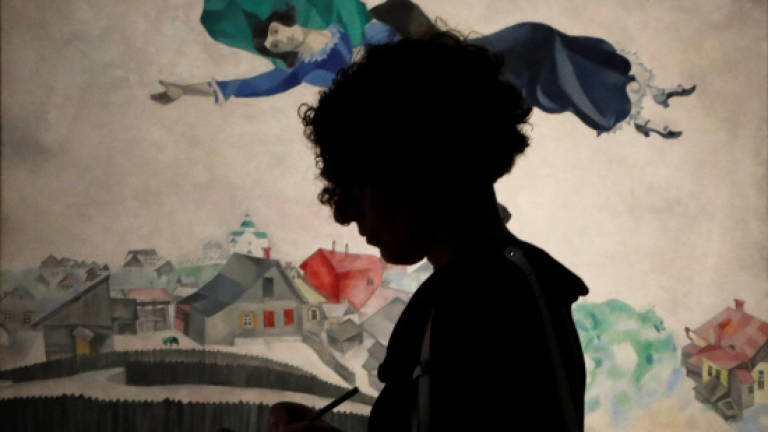Ukraine and Russia fight over Crimean heritage

SIMFEROPOL: The painting "Moonlit Night" by famed 19th century maritime artist Ivan Aivazovsky is a study in tranquillity: two boats sailing calmly across a placid sea.
But now the masterpiece is caught up at the centre of a storm between Ukraine and Russia as the violent feud between the two neighbours has spilt over into a cultural tug of war.
At Ukraine's request, last month Interpol added the painting, and 51 others by artists such as Ivan Shishkin and Isaac Levitan, to its list of stolen artworks.
Kiev insists the collection – valued at some US$1.3 million (RM5.5 million) – was illegally spirited away into Russian-controlled territory as Moscow took over and then annexed the Crimea peninsula in 2014.
The tussle over the artworks – owned by the Simferopol Art Museum in the Russian-held region – is just the tip of the iceberg in a furious dispute over artistic heritage and cultural identity raging between the two foes.
When Moscow seized Crimea, an estimated 1.2 million museum pieces fell under Russian control, according to the Ukrainian culture ministry.
"These are incredible losses for Ukraine," Mykola Yakovyna, the head of the Ukrainian chapter of the Blue Shield cultural protection group, told AFP.
'Intelligence' operation
Exactly how the Aivazovsky painting and the 51 other works ended up under Russian control is a murky story shrouded in claim and counterclaim.
When Russian troops in unmarked uniforms fanned out across Crimea to seize key installations in Feb 2014 the pictures were on display outside the region in the Ukrainian city of Mariupol as part of a touring exhibition.
Ukrainian officials insist that the paintings were then smuggled back to Crimea while officials in Kiev were distracted and scrambling to react as Moscow seized the territory.
The region's Kremlin-installed leader Sergei Aksyonov later claimed his officials "recruited people" on the Ukrainian side to help snatch the pictures, saying his authorities had to act like an "intelligence agency".
Earlier this month Ukrainian state prosecutors launched a criminal probe against the management of the Mariupol museum for allowing the works back to Crimea.
Two museum officials and one other suspect currently in Crimea face up to 12 years in prison over the transfer.
But despite the investigation and the Interpol wanted note, many fear Ukraine has little chance of reclaiming the collection while Russia's grip remains tight over Crimea.
"This is some kind of nonsense," the region's Kremlin-loyal culture minister Arina Novoselskaya told AFP.
At the end of 2016 after two years of investigation, a Dutch court forced the Allard Pierson Museum in Amsterdam to return the historic collection of Crimean art treasures displayed in an exhibition titled: "The Crimea: Gold and Secrets from the Black Sea", back to Ukraine, but not to Crimean museums.
"The claim by Crimean museums that the artefacts are Crimean heritage, or belong to the Autonomous Republic of Crimea was not accepted by the judges, because neither are sovereign states," the Amsterdam regional court stated.
Cultural 'kidnapping'
The dispute over the paintings comes amid a broader spat between Ukraine and Russia over the long cultural heritage that the two neighbouring countries share.
Officials in Moscow and Kiev have jousted over which side can claim rights over different historical figures – with Ukraine claiming the Kremlin is trying to follow up its land grab by usurping some of its most revered personalities.
Last Nov Russian President Vladimir Putin unveiled a huge statue outside the Kremlin of St. Vladimir, also known as Vladimir the Great, the 10th-century prince from Kiev who adopted Orthodox Christianity.
The move was seen as a pointed jab against Ukraine, where an iconic monument of Vladimir stands on a hill overlooking Kiev, and sparked complaints of cultural expropriation.
The Kremlin strongman again rattled sensitivities in May, when, at a press conference in Paris, he referred to Anne of Kiev, a medieval princess who became queen of France, as "Russian Anne".
Kiev immediately accused him of trying to "kidnap" her from Ukrainian history.
But the cultural claims have not just gone one way.
Ukrainian President Petro Poroshenko raised eyebrows in Moscow in June by officially claiming painter Aivazovsky as "part of Ukrainian heritage".
Aivazovsky, born in Crimea to Armenian parents in 1817, is widely viewed internationally as a Russian artist. — AFP